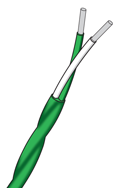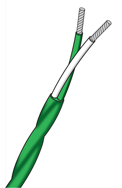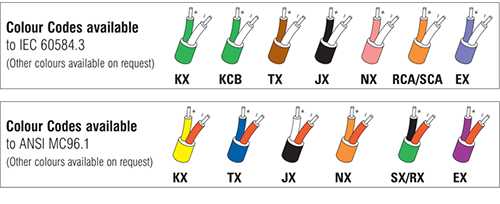Thermocouple Cable - PFA Insulated Twisted
Thermocouple Cables - Single Pair
Request a Quote
Buy Online from TC Direct
Data Sheet
TC - Trusted by UK manufacturers, OEMs, and research labs for over 50 years.
|
 |
 |
||||||
| PFA Twisted
One pair of solid conductors PFA insulated. Pair twisted and PFA sheathed. |
PFA Twisted
One pair of stranded conductors PFA insulated. Pair twisted and PFA sheathed |
|||||||
| Stock Number | B25 | B35 | B55 | B65 | ||||
 |
Conductor Style | Solid | Stranded | |||||
| No. of Strands / Strand Diameter (mm) | 1/0.5 | 1/0.8 | 7/0.2 | 13/0.2 | ||||
| Total Area (mm2) | 0.2 | 0.5 | 0.22 | 0.44 | ||||
| Total AWG (S = Stranded) | 24 | 20 | 24S | 21S | ||||
| Insulation | PFA | PFA | ||||||
 |
Number of Pairs | 1 | 1 | |||||
| Laid Flat or Twisted | Twisted | Twisted | ||||||
| Screen | No | No | ||||||
 |
Insulation | PFA | PFA | |||||
| Insulation Rating (ºC) |
Continuous | -75 to +250 | -75 to +250 | |||||
| Short Term | +300 | +300 | ||||||
| Colour Coding | Yes | Yes | ||||||
| Physical Properties |
Abrasion Resistance | Good | Good | |||||
| Moisture Resistance | Very Good | Very Good | ||||||
| Typical Weight (Kg/100m) excl reel |
1 | 3 | 1 | 2 | ||||
| Diameter under Armour (mm) | — | — | ||||||
| Diameter over Armour (mm) | — | — | ||||||
| Overall Diameter | 3 | 3 | 3 | 3 | ||||
| Popular Order Codes | B25KX, B25TX, B25JX, B25EX, B25RCA B35KX, B35TX, B35JX, B35RCA |
B55KX, B55TX, B55JX, B55NX, B55RCA B65KX, B65TX, B65JX, B65RCA |
||||||
| Notes All dimensions are approximate |
Round section (pair lay visible through sheath). Rejects electromagnetic interference. Gas, steam and water tight insulation. |
Round section (pair lay visible through sheath). Rejects electromagnetic interference. Gas, steam and water tight insulation. |
||||||

Frequently Asked Questions
- What is a thermocouple cable, and why is it important?
A thermocouple cable is used to connect a thermocouple sensor to measurement equipment. It transmits the temperature signal generated by the thermocouple, ensuring accurate readings are maintained. The choice of cable material (such as PVC, PFA, or fibreglass) affects the cable's durability, temperature range, and resistance to environmental factors, making it critical to select the right one for your application. - What are the different types of thermocouple cables available?
Thermocouple cables are categorised into extension and compensating types. Extension cables (X) use the same material as the thermocouple for accurate signal transmission, such as Type KX (Type K), Type JX (Type J), and Type TX (Type T). Compensating cables (C) use alternative alloys to mimic the thermocouple’s response over a limited range, such as Type KC (Type K) and Type SC/RC (Types S and R). - What insulation materials are available for thermocouple cables?
We stock over 3 million metres of thermocouple cable with a variety of insulation material, including PVC, PFA, fibreglass, ceramic fibre, XLPE, and silicon rubber. PVC (105ºC) is a good general purpose cable, PFA (250ºC) has good chemical and oil resistance, Fibreglass (480ºC) is good for industrial use at higher temperatures and Silicon Rubber (200ºC) is a good choice if a very flexible cable is required. For a more detailed overview of insulation materials, visit our insulation guide.

 France
France Germany
Germany Spain
Spain Netherlands
Netherlands Italy
Italy Hungary
Hungary United States
United States Australia
Australia